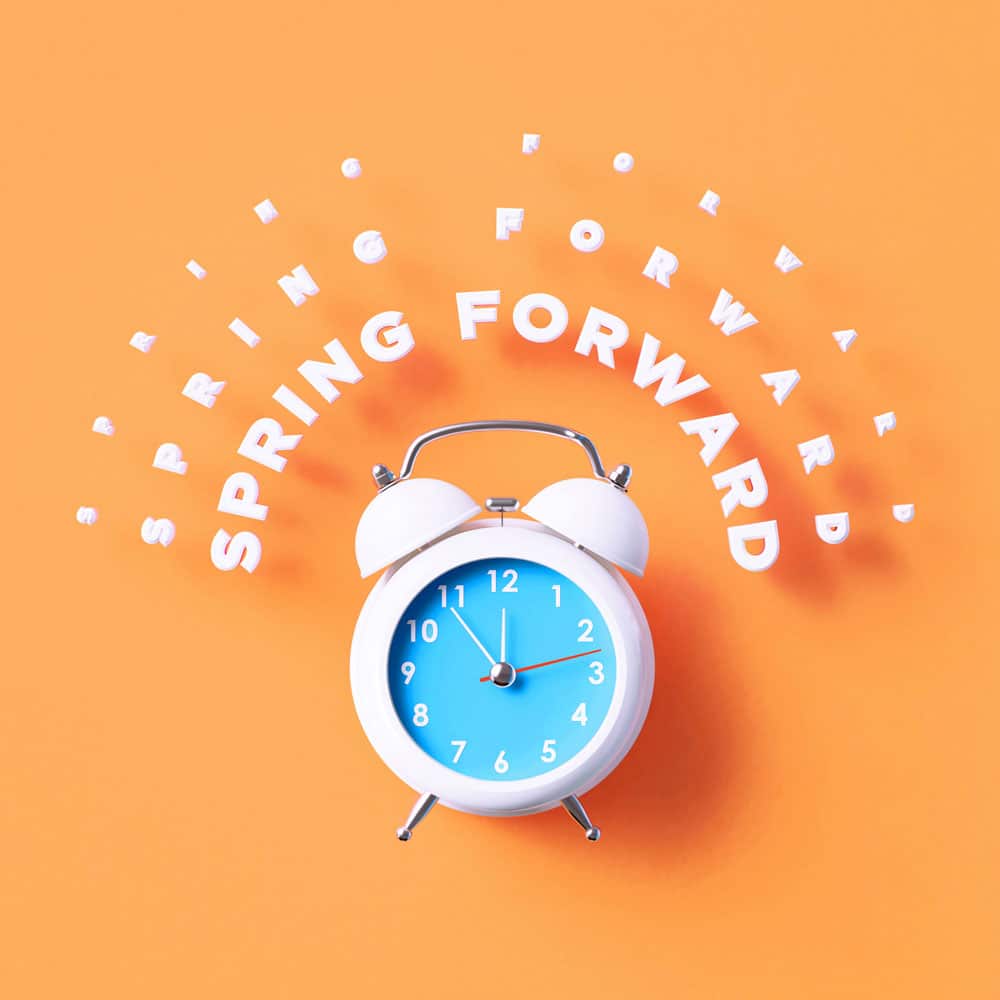By Anna McKenzie
How do you know if you’re getting enough sleep? Sometimes a lack of sleep comes from a busy schedule, overconsumption of caffeine or alcohol, or an anxious mind. But sleep problems can have many contributing factors and no single solution. According to the Centers for Disease Control (CDC), one-third of adults (35%) don’t get enough sleep (roughly seven hours a night).
As we “spring forward” during Daylight Saving Time, many of us will endure the tiresome reminder that we’re not getting enough sleep on a regular basis. As Spring Break rolls around, it may be wise to pursue some habits of rest and relaxation that we can carry into the remainder of the year. But how can we start engaging in true rest? What are some habits that will (and won’t) give us the z’s we need to actually feel refreshed?
As we “spring forward” during Daylight Saving Time, many of us will endure the tiresome reminder that we’re not getting enough sleep on a regular basis.
How We’re Losing Sleep
Fortune magazine reported that lack of sleep costs the US economy $411 billion every year. But just how are we losing all this sleep? A study from the US Committee on Sleep Medicine and Research reported that up to 70 million Americans have a sleep disorder. Conditions like sleep apnea and insomnia can cause these issues, as well as anxiety, PTSD, and depression. Weight, alcohol consumption, caffeine intake, sensitivity to noise, blue light, an abundance or lack of natural light, chronic pain, and other factors can also drive sleeplessness. Even things like having a stressful job or school career, young children, or a partner who snores can contribute to ongoing sleep deprivation.

The COVID-19 pandemic has been no help, either. The New York Times reports that a condition called “coronosomnia” has affected the sleep patterns of many since the onset of the pandemic, and it includes sleeplessness, vivid dreams, nightmares, and heightened anxiety. While coronosomnia may be starting to subside with the recent declining numbers and loosened restrictions, it wouldn’t be surprising to learn that the current situation in Russia and Ukraine might be picking up where the pandemic leaves off.
While feeling tired all the time due to lack of sleep can be aggravating, long-term sleep issues can cause serious health problems. The New York Times also reports that among other effects, losing sleep on a regular basis can lead to a poor immune system, depression, a decreased ability to focus, and a greater likelihood of developing chronic issues (like heart disease, or even dementia, for those over 50).
So, if you’re among the many dealing with chronic sleep problems, what can you do about it?
Remedies for Feeling Tired All the Time
Fortunately, there are some remedies for feeling tired all the time. You may want to reach for caffeine or energy drinks in the moment, but those are short-term solutions that may disrupt your sleep patterns further in the long run. (If you really need a short-term solution, especially if you’re driving or caring for dependents, use one, but also work on developing healthier long-term habits.) Here are some options for rest and relaxation that may improve the quality and duration of your sleep:
- Wind down with meditation before bedtime (not devices)
You may feel like Netflix helps you relax, but it’s probably keying up your brain with blue light and stimulating your thoughts. Set aside your phone, too. A lack of new input and light tells your mind it’s time to shut down for the night. (You can use a mediation app if you need to; just switch your phone to “night mode” to eliminate the blue light.)
- Exercise during the day, but not within a couple hours of bedtime
Your body needs activity to keep everything functioning well. Sometimes you can feel lethargic if you don’t move around, and sleep won’t come as easily. Get a good workout and then start winding down a couple hours before bedtime so that you aren’t still energized when you hop into bed.
- Opt for herbal tea and mindfulness instead of drugs or alcohol
You may seek out substances to silence your mind, but you can easily get dependent on them. And they won’t have a healthy effect on your body, short-term or long-term. Instead, reach for herbal tea and start practicing mindfulness. Journal if you feel like you need to express some of your thoughts or emotions from the day. Reflect on your day in your journal, and then set it aside.
You may want to reach for caffeine or energy drinks in the moment, but those are short-term solutions that may disrupt your sleep patterns further in the long run.
If you feel like you need a sleep aid, try melatonin first. It’s a natural supplement which is non-habit-forming. But if you continue to suffer from insomnia or sleep issues, it may be time to do a sleep study. Clinicians can provide options for you once you participate and they understand your issues further. Even though it means sleeping with sensors on for a night, it’s better than suffering night after night without a solution.
What if you have a partner who snores? That person may need gentle nudging toward a sleep study. If the issue continues and your partner won’t act, you may need to sleep somewhere else for a while. Even if it may seem awkward to sleep separately, getting sleep is a health issue. No one says you have to sleep in the same bed to have a healthy relationship. In fact, your relationship may get better if you’re both getting the sleep you need!
Help for Drug and Alcohol Dependence
If you find yourself dependent on drugs or alcohol because you have trouble sleeping, whether due to depression, chronic pain, PTSD, anxiety, or other issues, we can help. Contact us today to learn more about our inpatient and outpatient programs, which offer research-backed solutions for living a fulfilling, healthy life without substances.

